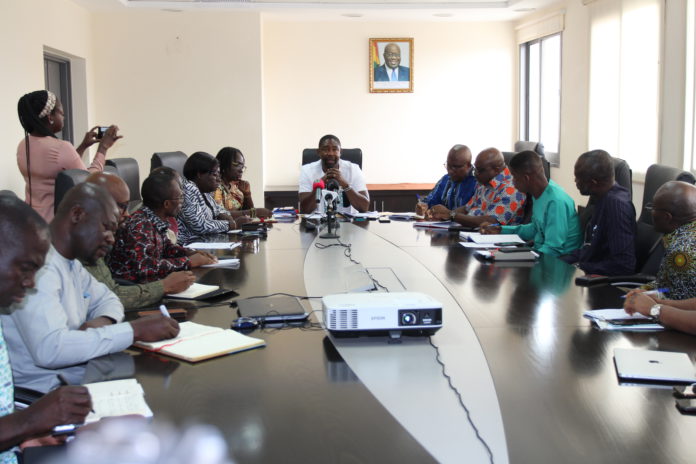The National Health Insurance Authority (NHIA) has outdoored two new steps to eliminate illegal co-payment system, otherwise known as extortion or illegal charges on covered service for National Health Insurance Scheme (NHIS) subscribers in health facilities across the country.
The two steps include the inauguration of a nine-member committee named the Illegal Co-payment Committee to handle the monitoring, reporting and tackling of illegal charges in all health facilities credentialed by NHIA.
They are also mandated to identify hospitals charging illegally and the level of the charge and report to the Executive Management of the NHIA for action.
The nine-member committee is made up of members of staff of NHIA and staff who are aware of the causes of the problem, the dynamics of the problem and how to address the problem.
Speaking at the inauguration of the Illegal Co-payment Committee, the Chief Executive officer of NHIA disclosed that aside the nine-member Committee inaugurated at the National level, there is going to be replicated committees in all 16 regions as well as all districts across the country to tackle illegal payment issues at the regional level as well to help work expeditiously.
“The law mandates every Ghanaian to be registered onto the NHIS, it is an obligation and not a choice and those who are patriotic enough to obey this law sometimes go through some unpleasant experience of being asked to pay certain money even when they are active on our insurance scheme and covered by us,” Dr Oko Boye stated.
According to him, NHIA is aware that the biggest complaint and biggest challenge that NHIS subscribers face, for which reason some of them are reluctant to renew their membership has to do with co—payment otherwise referred to as extortion, illegal charges.
“In as much as we don’t want you to pay anything at any hospital in Ghana if you are with health insurance, you are better of with a health insurance cover even with an issue of copayment than not being covered at all,” he added.
“A pregnant woman who goes for Caesarian Section, having our card, who is subjected to an extortion of Ghc100, as unfortunate as it may be, that Ghc100 would have turned into Ghc3,000 if you don’t have health insurance,” he added.
The second innovation being rolled out by NHIA to eliminate the illegal co-payment system is the introduction of an NHIA desk in major health facilities in every district in Ghana.
The desk, which is dubbed ‘The pulpit’, Dr Oko Boye described would be a semblance of an actual pulpit seen in churches, branded with the NHIA brand identity with a stationed NHIA staff constantly attending to concerns of patients relating to NHIS, illegal charges among others.
According to him, although it is the plan of the Authority to have ‘The Pulpit’ in almost every health facility accredited by NHIA, the Authority is going to implement the new innovation starting from the biggest health facilities in every district that NHIA has accredited.
According to NHIA, the presence of The Pulpit in NHIA accredited hospitals is meant to build the confidence of the public in NHIA and a deterrence to hospitals against unapproved charges.
“We believe that the mere presence of the pulpit will build confidence in our clients and also, not all our providers are people who do unapproved things, most of them do well, but the few who don’t really care about what happens and will do anything, the presence of The Pulpit might be some form of deterrence because they know that if they engage in unapproved activities, we will receive the report in real time,” he added.
The Pulpit is meant to support the work of the committee. The CEO, hence urged the newly inaugurated nine -member committee to take advantage of the presence of the Pulpit in the facilities.
Background
In June last year, Corruption Watch broke a story titled, Pay or Die! The agony of pregnant women in hospitals.
In the two-part documentary, Investigative Journalist Francisca Enchill uncovered how pregnant women who were NHIS subscribers, hence entitled to free maternal healthcare, were forced to pay for covered services and in worse cases, pregnant women in need of emergency care were left unattended to until payments were made for the covered service in a cash-and-carry manner.
The investigation captured the 37 Military Hospital, Korle-Bu Teaching Hospital, Mamprobi Hospital, and Maamobi General Hospital, Kaneshie Polyclinic and Ga West Municipal Hospital, popularly known as the Amasaman Hospital, all engaged in the act that endangered the lives of pregnant women and their unborn babies.
NHIA’s Communications and Media Relations Manager, Berima Sarpong, in an interview with Corruption Watch disclosed that following the release of the ‘Pay or die’ documentary, the Board of NHIA in collaboration with the Ministry of Health set up a committee to independently investigate findings of the investigative report.
This, according to him, is the biggest challenge NHIA has with the NHIS.
According to him, upon the instruction of the Board’s committee, the Operations unit of NHIA set up a taskforce which was assigned to visit health facilities exposed by the investigation to confirm findings of the ‘Pay of Die’ report.
He said following the confirmation of findings of the documentary, an audit was done and the facilities were contacted for their response.
As part of the reasons given for their illegal charges, they mentioned low tariffs on medicines as one of the causes, hence in NHIA’s quest to eliminate the unapproved charges, NHIA approved a tariff increment on medicine and services. An increment which took effect from July 1, 2022.
NHIA also withheld money from claims of health facilities involved. On May 19, 2022 NHIA refunded monies paid illegally to victims to the tune of GHc16,469.71 at the Head Officer of the NHIA.


